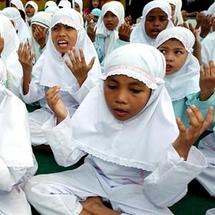
Many are in danger of abuse and neglect from carers, as well as exploitation and international trafficking, with children aged under three most at risk.
"One of the biggest myths is that children in orphanages are there because they have no parents. This is not the case," the report said.
"Most are there because their parents simply can't afford to feed, clothe and educate them."
At least four out of five children in orphanages have a parent, with the figure as high as 98 percent in central and eastern Europe, the report said.
In Zimbabwe, the figure is 59 percent and 88 percent in Liberia, where a big increase in orphanages in the African nation in recent years has raised concerns of trafficking, the report said.
Ninety percent of so-called orphans have a parent in Ghana, where, according to government figures, only eight of the 148 known orphanages are licensed.
Sri Lanka, which has suffered decades of civil war, has 80 percent, while Indonesia, the country worst hit by the 2004 tsunami, has 90 percent.
In Brazil, more than 80 percent of children have a living parent.
"In many institutions (across the world), the standard of care is poor. Many children are abused and neglected," the report said.
"Institutional care should only be used as a last resort, and only then if it's of a high standard and in the best interests of the individual child."
Some governments and donors mistakenly regard orphanages and similar institutions as the best place for disabled children and those with HIV/AIDS.
"Discrimination and cultural taboos also mean that in some countries a disproportionate number of girls, disabled children and children from minority ethnic groups are relinquished or abandoned into care institutions."
The report calls on governments to better commit to tackling poverty that drives families to give up their children. Projects to help families look after children at home were also needed, along with a transformation of childcare in many countries and stricter monitoring of orphanages.
--------------------------------------------------------------------------------------------------------------------------------
"One of the biggest myths is that children in orphanages are there because they have no parents. This is not the case," the report said.
"Most are there because their parents simply can't afford to feed, clothe and educate them."
At least four out of five children in orphanages have a parent, with the figure as high as 98 percent in central and eastern Europe, the report said.
In Zimbabwe, the figure is 59 percent and 88 percent in Liberia, where a big increase in orphanages in the African nation in recent years has raised concerns of trafficking, the report said.
Ninety percent of so-called orphans have a parent in Ghana, where, according to government figures, only eight of the 148 known orphanages are licensed.
Sri Lanka, which has suffered decades of civil war, has 80 percent, while Indonesia, the country worst hit by the 2004 tsunami, has 90 percent.
In Brazil, more than 80 percent of children have a living parent.
"In many institutions (across the world), the standard of care is poor. Many children are abused and neglected," the report said.
"Institutional care should only be used as a last resort, and only then if it's of a high standard and in the best interests of the individual child."
Some governments and donors mistakenly regard orphanages and similar institutions as the best place for disabled children and those with HIV/AIDS.
"Discrimination and cultural taboos also mean that in some countries a disproportionate number of girls, disabled children and children from minority ethnic groups are relinquished or abandoned into care institutions."
The report calls on governments to better commit to tackling poverty that drives families to give up their children. Projects to help families look after children at home were also needed, along with a transformation of childcare in many countries and stricter monitoring of orphanages.
--------------------------------------------------------------------------------------------------------------------------------









 Home
Home Politics
Politics









